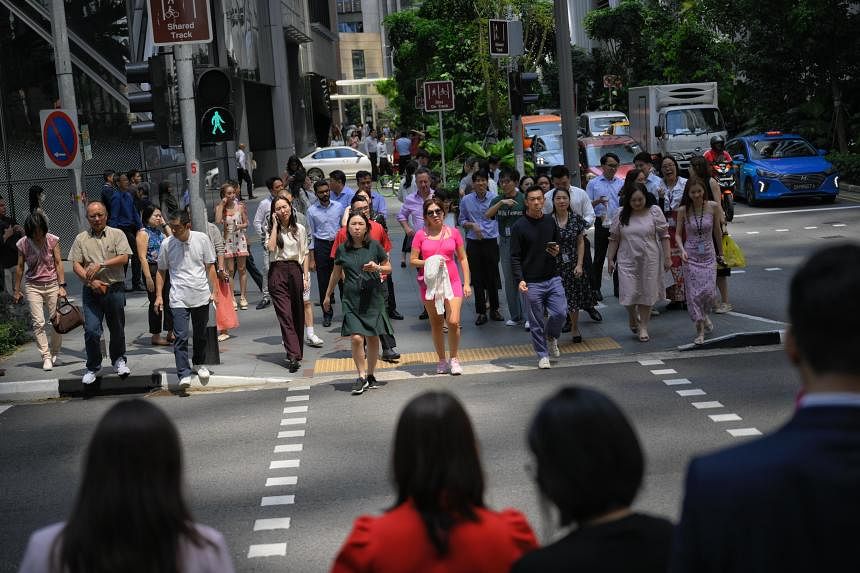SINGAPORE – The recently announced guidelines on flexible work arrangements have prompted Singapore-based companies to rethink their workplace policies.
Many local employers, including those with flexible work arrangements already in place, see the potential for increased productivity and employee satisfaction, but smaller firms appear less convinced.
These companies with limited resources and manpower are acutely aware that such arrangements may hamper their ability to shape workplace culture and meet business objectives.
Larger firms are already well down the flexi-work path.
Ms Wiwi Goh, market human resources lead at Google Singapore, told The Straits Times on April 23 that the company does not stipulate working hours, creating what it says is an environment where employees can “innovate the best ideas”.
She said: “Beyond having flexi time, our flexi-place culture allows Googlers to work from wherever they work best two days a week, or work from anywhere in the world for up to four weeks a year.
“This hybrid approach balances the need for flexibility with their three in-office days to connect with colleagues and allow for greater collaboration.”
Ms Goh added that the firm will upgrade its policies in line with the new guidelines, which were formulated by the Tripartite Workgroup on Flexible Work Arrangements and announced on April 15.
They adopt a broad definition of flexible working arrangements that employers must fairly consider and be open to offering, including flexi-place, flexi-time and flexi-load options.
Flexi-place arrangements let staff choose to work elsewhere from a designated workplace, or have no designated workplace to begin with. Flexi-time arrangements entail employees working flexibly at different timings with no changes to total work hours and workload, while those on flexi-load arrangements generally take up different work loads, with pay adjusted to match.
All employers here must fairly consider formal staff requests for flexible work arrangements from Dec 1, 2024.
Ms Doreen Tan, head of Asia at cloud-based data storage company Dropbox, said the firm has operated on a “Virtual First” model since October 2020, where remote work is the default for all employees.
She added that a recent internal survey found that 82 per cent of employees cited high levels of effectiveness, while 78 per cent agreed that they were productive using the company’s remote work model.
“We will be eagerly following the roll-out of the changes in Singapore, as there may be takeaways we could consider for our own model,” Ms Tan said.
Ms Jacinta Low, head of talent and performance management and sustainability at OCBC, said flexi-place, flexi-time and flexi-load work arrangements have been available to the bank’s employees since before the pandemic.
She noted that supervisors are encouraged to conduct regular check-ins and introduce feedback mechanisms to address any challenges that may arise after employees take up their preferred work arrangement.
While flexible work arrangements may boost productivity for large companies, smaller firms such as start-ups have noted that a balance has to be struck between maintaining employee satisfaction and ensuring that workers can still fulfil their job responsibilities.
Ms Fernn Lim, chief operating officer of fintech start-up audax, said the firm ensures its employees do not exploit flexible work arrangements by clearly outlining its expectations to them so that they can remain on track with their responsibilities.
Regular check-ins between managers and employees are also conducted to monitor progress, provide feedback and check on staff well-being, she added, noting that all employees are expected to remain contactable during work hours.
Ms Lim said no changes will be made to the firm’s flexi-place and flexi-time arrangements once the new guidelines kick in, but it will need to evaluate which roles qualify for flexi-load arrangements, which can be more complicated to set up.
Mr Nima Karimi, founder and chief executive of fellow fintech start-up Lendela, said decisions to accommodate flexible work requests are made on a needs-based basis.
The firm takes into account several factors, including personal circumstances, living conditions, tenure, performance and whether an employee’s role is tied to a specific market.
While Mr Karimi acknowledged that flexible work arrangements can be beneficial, he also pointed out that there is a need for start-up employees to work together and “fight the fight” every day, as firms like his face more challenges than mature or larger companies.
“This involves helping each other succeed and carrying one another when someone falls behind. We also need to create a culture from scratch, which is much harder to do over a screen,” he said.
Both small and larger companies in Singapore agree that apart from increased productivity, flexible work arrangements may also help cut costs while attracting and retaining talent.
Mr Karimi said the new guidelines will help the company structure its workplace policies and enable it to gain a deeper understanding of what prospective employees might be looking out for in an employer.
He added that although flexible work arrangements might not be feasible for the company yet, given the customer-facing nature of some of its work teams, there is a clear financial advantage to having smaller office spaces.
audax’s Ms Lim said flexible work arrangements can help to enhance morale, job satisfaction, and hence talent retention among existing employees, which contributes to a positive workplace culture.
“This is also a trend that we are seeing from interviewing candidates as part of a modern workforce approach,” she added.
Ms Sumita Tandon, Asia-Pacific human resources director at LinkedIn, said flexible working is no longer seen as a rarity but is becoming the norm, and is one of the most important factors influencing a professional’s decision to work for a company.
She added: “By offering workplace flexibility and subsequently a healthier work-life balance, companies are more likely to both attract and retain their talent, leading to better results for the company in the long run.”


